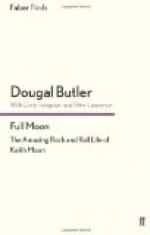“I had hardly got inside before your sister came with her husband to see me—to beg me to go with her to Flint House and reason with your brother. To reason with him! He was beyond the futility of argument, the folly of retort. I did not want to go—at first. Then it dawned upon me that a kindly fate offered me a providential chance of securing my safety. No suspicion could fall on me if I went back—and found the body.
“And so it turned out. We reached Flint House just at the right moment, for me. I broke into the room and found him—dead. He was not where I had left him. In a last paroxysm he had struggled to his feet and fallen across the clock-case, with the intention, as I shall always believe, of putting back the hand of the clock. I think his dying vision saw me alter it, and his last thought—his last effort—was to thwart my intention to mislead those upon whom would devolve the duty of investigating his death. But death was too quick to allow him to carry out his intention.”
The cessation of the speaker’s voice was followed by silence. Thalassa had nothing to say—no need for words. Austin Turold could not trust himself to speak. It was not that his cynical philosophy of life failed him at that moment. The eternal staging of the drama was the eternal tragedy of the performers. But he was thinking of his son. He had vision enough to realize that in Sisily’s death Charles had lost all. His own hardness of outlook melted at that thought. It crumbled his worldliness to ashes, flooded his heart with vain regret, found utterance at last in the whispered words—
“How am I to tell my son?”
His eyes, dwelling on the door of the inner room, revealed the direction of his thought.



